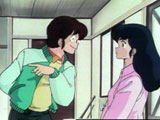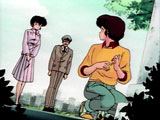

Quick Links:
Maison Ikkoku, Box Set 1
Rumiko Takahashi is a big deal in the Japanese manga world. She has put out insanely popular manga for years, so it should not be surprising that her stories get the anime treatment. Those of you who watch Cartoon Network’s Adult Swim are likely familiar with the mythical Inu Yasha, one of Ms. Takahashi’s creations. Another series of hers that has been around for years is Urusei Yatsura. Both of these shows feature fantastical elements, so you could be forgiven for believing that this is Ms. Takahashi’s main area of focus. That would overlook one of her earlier creations, though, the thoroughly down-to-earth Maison Ikkoku.
The story centers around the apartment building known (appropriately enough) as Maison Ikkoku. As the story begins, our hero, Yusaku Godai, a university ronin (i.e., someone who has failed his first round of university entrance exams, and is going to cram school to try to get into a university next year), is threatening to move out of the apartment complex. He wants to leave because the other tenants will not leave him alone and allow him to study for his entrance exams. Every night they are partying in his room until the break of dawn, and Godai knows he is doomed to always be a ronin if he can’t break free. As fate (and the storyteller) would have it, right as he is about to leave for good, a beautiful young woman, Kyoko Otonashi, enters the building and announces that she is the new apartment manager. For poor Godai it is love at first sight, and thus begins our story of how he stumbles along in his quest to win Kyoko’s heart.
This first box set for the show contains three DVDs, each of which contains four episodes. Due to the way the show is paced, each disc in this set ends up having its own feel, so I will briefly touch on the contents of each disc to give you a feel for what this set contains. The first disc, as is to be expected, sets up the general premise for the show by introducing most of the primary characters. We quickly get introduced to the main characters: the aforementioned Yusaku Godai and Kyoko Otonashi, as well as the other residents of Maison Ikkoku. Those are Hanae Ichinose, a drunkard with a young son, Kentaro; Akemi Roppongi, another drunkard who likes to wander around the apartment building in skimpy underwear; and Yotsuya, a mysterious gentleman (who I suspect is actually yakuza) who seems to take it as his life’s mission to torment Godai. These other residents like to make Godai’s life impossible as he studies to pass his university entrance exams, going so far as to have drunken parties in his apartment every night so that it is impossible for him to study. This is why he wants to leave the apartment, but Kyoko’s appearance changes his mind. The rest of the disc shows Godai’s initial, stumbling attempts to get close to Kyoko, but he’s such an idiotic screw-up that it doesn’t go very well. He also has a disturbing habit of trying to kiss Kyoko when she’s unconscious or sleeping, which is just creepy. Even with all that, by the end of the disc you can see a glimmer of affection on Kyoko’s part as Godai finally begins taking his entrance exams for the season.
The second disc brings some significant revelations, and introduces a new recurring character; Kyoko’s niece, Ikuko. Godai’s grandmother visits to check on his attempts to enter a university, some significant details of Kyoko’s past is revealed, and Godai finally admits to the world that he is in love with Kyoko. Of course, being Godai, he manages to announce his love to the world without actually announcing it properly to Kyoko, herself. The third disc introduces Godai’s main rival for Kyoko’s affections, Shun Mitaka, a local tennis coach. This drives Godai crazy, of course, which leads to some funny hijinks as the two men verbally spar with each other after tennis lessons and during a visit to the beach (hey, it’s anime; gotta have a beach episode!). The disc is rounded out with an episode focused on Kentaro and Ikuko, and then ends with an episode that introduces a new rival for Godai’s affections, of all things.
Taken as a whole, the episodes in this set are pretty good. At first, I found it hard to really like Godai. He’s pretty stupid, somewhat of a lecher, and just fairly lame overall. There are lots of ‘lovable losers’ in various anime shows, but Godai wears his flaws on his sleeve, as it were. Kyoko also seems pretty one-dimensional at first, as her only role is to be the target for Godai’s attempts at romance. The middle set of episodes is pretty mixed in quality. They contain some excellent pieces of character development, though Godai’s actions in episode 8 made me cringe. Not my favorite episode. By the end of the second disc I was wondering if this show would ever really grab my interest; even though I was coming to enjoy some of the characters, they were still very one-dimensional.
Luckily, the third disc is wonderful. The addition of the tennis coach, who also is after Kyoko, really gives a great dynamic to the show. Now Godai has to really kick his act into high gear, as the coach is pretty much a better man than him in every respect. I very much enjoy watching those two go at it. This also helps round out Kyoko’s character as well, as she now has to decide which way she wants to lean, and she seems to be having some trouble making up her mind, as she is still clinging to the past in many ways. Her reactions to Godai’s new ‘friend’ in episode 12 are just great. So, to sum up, the box set starts out OK, lists some in the middle, and then ends on a high note. One other good thing about this set is that none of the episodes really feels like ‘filler.’ Each episode does at least a little something to drive the story forward, and I can’t think of any episode that you could just completely skip without missing something relevant.
Now that we have established that the show is actually pretty good, let’s cover the presentation for the set. The DVDs are in standard cases, and they come in a box to hold them. The box itself is really flimsy and probably won’t stand up to much use, but it does have an excellent picture of the main cast on it. The picture quality is really great, especially when you consider that this show is well over 15 years old. I don’t know if any restoration work was done on the film, but the colors are vibrant and the character animation is excellent. There are a few times during panoramic scenes of the city where it looks like one or two of the animation cells are out of alignment, but that problem never occurs during scenes with any of the characters. Yes, it looks old when compared to, say, a modern Gonzo all-digital show, but it still looks better than I expected.
The sound quality, unfortunately, does not hold up as well as the picture quality. While the voices sound fine, the background music has some noticeable distortion in it. I don’t blame the publisher for this; it is simply what happens when you are dealing with an older, analog recording and you transfer it to a sharper, digital medium. It never really distracts from the show, but it did make me wince a couple times. This is the primary reason for the mediocre audio score. Also, due to the age of the show, the Japanese audio track is in mono, while the English audio track is in basic stereo.
Overall, Maison Ikkoku was a pleasant surprise. There are a lot of 'loser boy chases pretty girl' anime series out there, but the more down-to-earth approach of Maison Ikkoku makes it stand out from the crowd. And once the tennis coach appears, things really begin to get good. The minor characters could stand to be more appealing (and less weird), but the show still hits its mark with good character designs and good storytelling. If you are interested in a romantic comedy that actually deals with the flaws of all the characters, rather than glossing everything over, then this box set should fit the bill.
Distributor: Viz Creator: Rumiko Takahashi / Studio Deen / Kitty Film Released: 1986
Video Quality: B+ Audio Quality: C Presentation: B+ Content: A- Overall: B+



